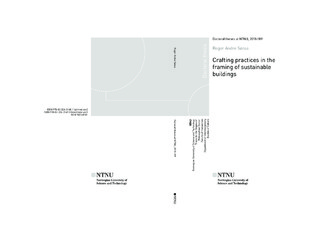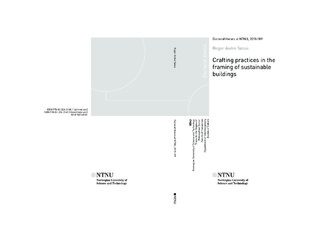| dc.contributor.advisor | Solli, Jøran | |
| dc.contributor.advisor | Fyhn, Håkon | |
| dc.contributor.advisor | Aune, Margrethe | |
| dc.contributor.author | Søraa, Roger Andre | |
| dc.date.accessioned | 2018-09-26T12:42:07Z | |
| dc.date.available | 2018-09-26T12:42:07Z | |
| dc.date.issued | 2018 | |
| dc.identifier.isbn | 978-82-326-3169-8 | |
| dc.identifier.issn | 1503-8181 | |
| dc.identifier.uri | http://hdl.handle.net/11250/2564735 | |
| dc.description.abstract | This doctoral thesis is an explorative study of craftspeople working in the building sector. It looks at both new and existing buildings, which are increasingly undergoing sustainable framing. It also investigates the practices of craftspeople working as agents of sustainability, who retrofit and build homes in line with climate change mitigation policies.
The thesis consists of four articles and an extended introduction (comprised of seven chapters). In the introduction, I provide a broad overview of the research context – the Norwegian building sector – and research subjects – craftspeople working in the sector. I also position the thesis within the theoretical framework of science and technology studies (STS), before introducing two theoretical concepts – framing theory and social practice theory – which I apply in a cross-cutting analysis of the four articles. The introduction also explains my methodological choices and outlines the manner in which I utilized qualitative interviews as my main empirical material.
The first article explores why energy retrofitting in private dwellings is difficult, and looks at the building sector’s governance by numbers, which is carried out by craftspeople working as energy consultants. These craftspeople are analyzed as intermediaries between an unruly building sector and a political governing body that seeks to frame sustainable buildings in a particular way.
The second article looks at how environmental policies have given craftspeople new jobs and roles, inviting them to retrofit old homes to meet energy reduction standards. These new practices are shown to have transformed the craftspeople into sustainable, green-collar workers.
The third article investigates and critically analyzes the tools that these new workers use, placing particular focus on energy saving calculators. The craftspeople working with this must learn how to use these tools and fit them into existing routines. However, the script of energy calculators does not necessarily facilitate professional domestication of the tools.
The fourth and final article discusses craftsmanship within technologized building projects, focusing on the relation between sustainability and craftsmanship on the construction site. It shows how the craftspeople negotiate their role as planning agents at major construction sites and how their hands-on knowledge is transferred to actual buildings, through different production philosophies.
In the conclusion, I argue for the concrete involvement of craftspeople in the policies and activities that shape their professions. As one key informant told us: “We know how to do this. We are the ones who build the houses!” As this thesis shows, the development of hands-on knowledge is crucial for undertaking the sustainable transformation to a more energy efficient building sector, which will affect society as a whole. | nb_NO |
| dc.language.iso | eng | nb_NO |
| dc.publisher | NTNU | nb_NO |
| dc.relation.ispartofseries | Doctoral theses at NTNU;2018:189 | |
| dc.relation.haspart | Paper 1:
Fyhn, Håkon; Søraa, Roger Andre; Solli, Jøran.
Why energy retrofitting in private dwellings is difficult in Norway: Coordinating the framing practices of government, craftspeople and homeowners. Energy Research & Social Science 2018 ;Volum 49. s. 134-142
https://doi.org/10.1016/j.erss.2018.10.022 | |
| dc.relation.haspart | Paper 2:
Søraa, Roger Andre.
Crafting environmental policies into action: Energy consulting practices of craftspeople. Craft Research 2018 ;Volum 9.(2)
Is not included due to copyright available at
https://doi.org/10.1386/crre.9.2.255_1 | |
| dc.relation.haspart | Paper 3:
Søraa, Roger Andre
Energy consultants calculating sustainability in the built
environment. Published in Facilities
https://doi.org/10.1108/F-02-2017-0014 | |
| dc.relation.haspart | Paper 4:
Fyhn, Håkon; Søraa, Roger Andre.
Craftsmanship in the machine: sustainability through new roles in building craft at the technologized building site. Nordic Journal of Science and Technology Studies 2017 ;Volum 5.(2) s. 71-84
https://doi.org/10.5324/njsts.v5i2.2321
This work is licensed under a Creative Commons Attribution-ShareAlike 4.0 International License. | |
| dc.title | Crafting practices in the framing of sustainable buildings | nb_NO |
| dc.type | Doctoral thesis | nb_NO |
| dc.subject.nsi | VDP::Humaniora: 000::Arkitektur og design: 140 | nb_NO |

